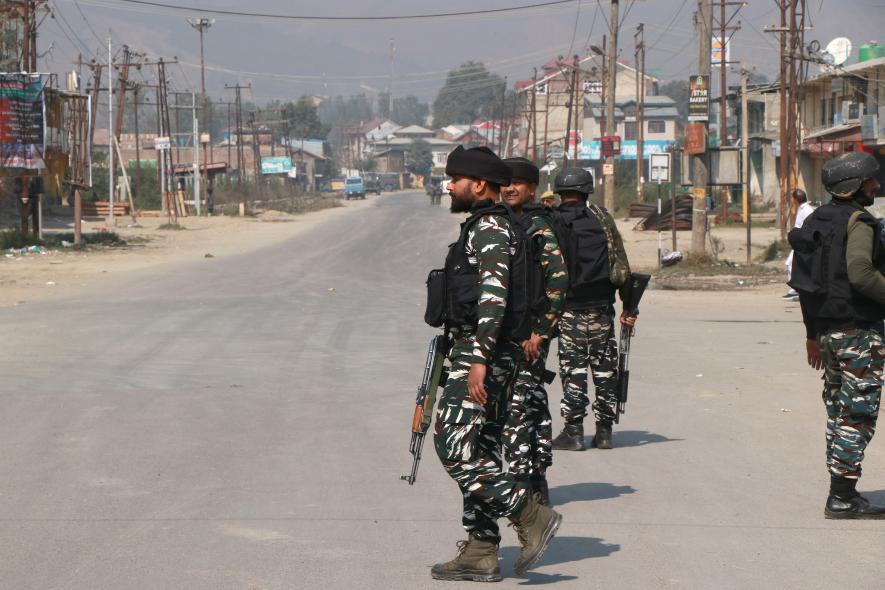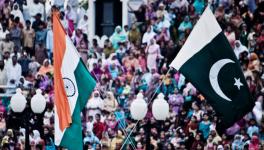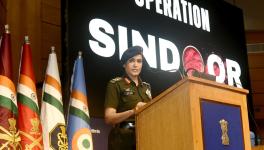Six Including 2 Non-locals Killed Across J&K Amidst Spike in Militant Attacks

Goverment forces near the encounter site in Pampore area of Pulwama. Image by Kamran Yousuf.
Srinagar: Two non-local civilians were among the six killings reported from Jammu and Kashmir union territory on Saturday as the gun battle in Poonch forests entered seventh day, mounting concerns about the security in the region amidst a surge in violence.
Two civilians were killed in Srinagar and Pulwama areas while two army soldiers, including a Junior Commissioned Officer (JCO), were reported to have been killed in the Poonch gunfight taking the casualties toll to nine so far in the ongoing military operation. In other incidents, two militants including a top Lashkar e Toiba (LeT) commander were reportedly killed in an encounter in Drangbal area of South Kashmir’s Pampore.
Suspected militants shot dead 30-year-old Arbind Kumar Sah, a resident of Banka Bihar in the heart of Srinagar city’s Eidgah locality. Arbind, who sold panipuri close to a paramilitary checkpost and a playground, was shot dead by assailants from a close range around 7 pm. He was found lying in a pool of blood and was rushed to a local hospital, but succumbed to his injuries, according to a police statement.
Within an hour, militants killed another non-local identified as Saghir Ahmad in South Kashmir’s Pulwama area about 30 km away from the first killing spot. Saghir, who was the sole bread earner in his family, which includes four sisters, worked as a wood carver in Kashmir. He was also shot from a point-blank range that killed him instantly.
Soon after the attacks, condemnations poured in from the administration and political leadership, who termed these killings “reprehensible” and a reminder of the worsened situation in the region.
“Strongly condemn the killing of Sageer Ahmed in Pulwama today. Another man who came to the valley in search of an income; in this case, as a carpenter. His death in the 2nd terror attack today is a grim reminder of the precarious security situation in Kashmir these days,” former chief minister Omar Abdullah wrote on Twitter.
Lt. Governor Manoj Sinha also condemned the killings of Sah and Saghir and urged people to speak against the killings.
“Perpetrators of these heinous attacks will be punished soon. We have intensified our efforts to crush terrorists and their ecosystem. They will have to pay a very heavy price for killing innocent civilians. I urge people to speak in one voice and join hands in the fight against terror,” the Office of the LG J&K said in a statement.
The two killings are latest in the series of target killings of civilians including members from minorities and non-locals that have rattled Jammu and Kashmir. The month of October has been worse with a total of 30 killings reported across the region which includes 10 civilians, 14 militants and nine army soldiers.
In the gunfight that ensued on October 11 in the general area of Dera Ki Gali in Jammu province’s Poonch region, fresh firing was reported from Bhatadhoryain Nar area after two bodies of army soldiers including a JCO was recovered taking the total number of army casualties to 9 since the encounter began. The two were identified as Subedar Ajay Singh, a resident of Uttarakhand’s Rampur village of Narendra Nagar Tehri and Naik Harendra Singh, a resident of Pipalsar village of Lansdowne Uttarakhand.
As per a statement by PRO (Defence) Jammu, Subedar Ajay Singh and Naik Harendra Singh of Indian Army were killed in action during search operations being conducted by the Indian Army along with Jammu and Kashmir Police in densely forested area of Nar Khas forest in Mendhar Poonch.
“On October 14, 2021, after a fierce firefight with terrorists, the communication with Subedar Ajay Singh and Naik Harendra Singh was disrupted,” the spokesperson said.
The operation to reestablish communication with the soldiers continued for days until their bodies were recovered on Saturday evening. The military operation being conducted close to the Line of Control (LoC) has entered seventh day amidst heightened security measures being implemented to close in on militants. The gunmen are believed to have infiltrated from across the LoC more than two months back.
The Jammu-Rajouri-Poonch National Highway has been closed between Bhimber Gali and Jarran Wali Gali stretch and the traffic has been diverted towards an alternative route as part of the security measures. The Poonch gunfight is one of the deadliest that the area has witnessed in years and has renewed fears of violence and security risks amongst locals and the security establishment.
The gunfight between highly trained militants and armed forces coinciding with civilian killings has worsened these fears. In the last two weeks, the Jammu and Kashmir Police claimed to have intensified the operations against militants and those with alleged links to separatist groups following which they detained hundreds across the valley to prevent the civilian killings. According to the police, as many as 13 militants were killed in the past one week in nine encounters after the first civilian killings were reported earlier this month.
“We have killed three out of five terrorists in Srinagar in less than 24 hours," the Inspector General of Police said. This included Shahid Khursheed of Srinagar and Umar Khanday of Pampore, a wanted LeT militant believed to be behind the attack and killings of two police personnel carried out in the capital. The two were killed in the Drangbal area of Pampore, about 20 km from Srinagar city.
The rise in militant attacks, especially with non-local civilians as “soft-targets”, is seen by many as an outcome of government’s ‘mishandling’ of Kashmir and an aftermath of the abrogation of Article 370 and 35 A, which guaranteed a special status to the region in reserving jobs and land ownership to local state subjects only. The fresh wave of violence has revived uncertainty amongst minorities and non-local workers about their security and the instability in the region, triggering their departure.
Get the latest reports & analysis with people's perspective on Protests, movements & deep analytical videos, discussions of the current affairs in your Telegram app. Subscribe to NewsClick's Telegram channel & get Real-Time updates on stories, as they get published on our website.























